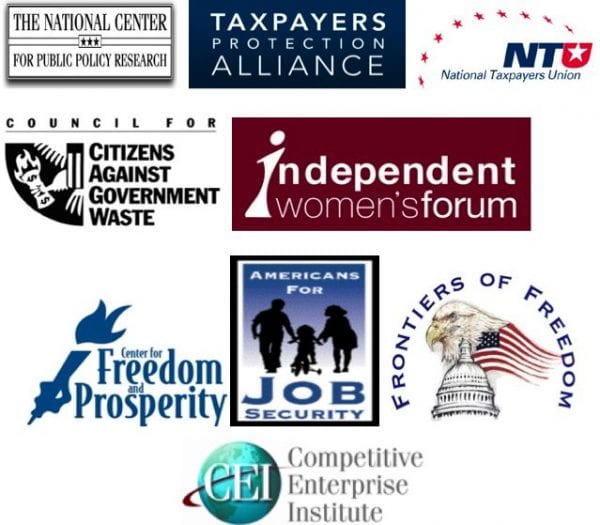
TPA Sends Coalition Letter to Congress Calling for Transparency on “Sue and Settle”
Taxpayers Protection Alliance
June 28, 2013

The Taxpayers Protection Alliance has been looking into the pernicious practice known as “sue and settle” for some time now. Sue and settle has harmful consequences for consumers, business, and taxpayers. Sue and Settle occurs when the EPA and a like-minded group coordinate a lawsuit between each other where there is no aggrieved party. The court then quickly adopts a pre-arranged settlement. In addition to undermining the adversarial litigation process, that settlement paves the way for new regulations that are favored by the environmental groups and the EPA. The Obama Administration has aggressively used Sue and Settle to further the regulatory power of the federal government but we have reached a tipping point. Today, TPA led an effort with seven other concerned organizations including National Taxpayers Union, Center for Freedom and Prosperity, Council for Citizens Against Government Waste, Independent Women’s Forum, National Center for Public Policy Research, Americans for Job Security, Frontiers of Freedom, and the Competetive Enterprise Institute sending a coalition letter to both the Senate and House of Representatives urging them to support legislation from Sen. Chuck Grassley (R-Iowa) and Rep. Doug Collins (R-Ga) to bring much needed transparency to “sue and settle.” The Taxpayers Protection Alliance will continue efforts to shed light on this practice with the hopes of bringing it to an end.
Read the full letter below:
June 28, 2013
United States Senate, United States House of Representatives
Washington D.C. 20510
Dear Member of Congress:
The undersigned taxpayer and free market watchdog groups write to express our support for S. 714 and H.R. 1493 sponsored by Sen. Chuck Grassley (R-Iowa) and Rep. Doug Collins (R-Ga.) respectively, that would bring more transparency to a pernicious attack on regulatory due process known as “sue and settle.” Congress has a unique role to play in limiting agency overreach and ensuring full transparency of the federal bureaucracy’s actions against America’s job creators and working families. Exposing a harmful practice known as “sue and settle” is a good place to start.
Over the last several years, government watchdogs and free market advocates have witnessed a federal agency power grab like no other in our nation’s history. Agency maneuvering around the congressional lawmaking process has far-reaching impacts on our nation’s economy and the very businesses and industries that will form the foundation of a full economic recovery. And in an era of dwindling federal coffers, expansions of agency power often come with a hefty price tag for U.S. taxpayers.
This unconventional tactic occurs when a federal agency, such as the Environmental Protection Agency (EPA), and a like-minded group, like the Sierra Club, coordinate a lawsuit between each other where there is no aggrieved party. The court then quickly adopts a pre-arranged settlement. In addition to undermining the adversarial litigation process, that settlement paves the way for new regulations that are favored by the environmental groups and the EPA — such as tougher emission standards for fossil fuels.
The deadline to execute the settlement is intentionally short term, which leaves those affected by the new regulation with little opportunity to react. The EPA then implements the new regulation on a rapid timetable and, if questioned, the agency defends its actions as “court-ordered.”
The effectiveness of sue and settle have led many environmental organizations to employ the practice as a significant part of their legal strategy. According to the U.S. Chamber of Commerce, “By filing lawsuits covering significant EPA rulemakings and regulatory initiatives, and then quickly settling, these groups have been able to circumvent the normal rulemaking process and effect immediate regulatory action with the consent of the agencies themselves.”
To add insult to injury, taxpayers are required to pay attorneys’ fees for both the government and the activist group suing the government. According to a recent Government Accountability report, most federal agencies keep no record of these payments to trial lawyers.
A May 2013 Chamber study, “Sue and Settle: Regulating Behind Closed Doors”, demonstrates just how pervasive and destructive the practice has become under the current Administration. The Chamber found:
- The Environmental Protection Agency, alone, chose at some point not to defend itself in lawsuits brought by special interest advocacy groups at least 60 times between 2009 and 2012. In each case, EPA agreed to settlements on terms favorable to those groups
- These settlements directly resulted in EPA agreeing to publish more than 100 new regulations
- While EPA and the Fish and Wildlife Service have been leaders in settling—rather than defending—cases brought by advocacy groups, other agencies, including the U.S. Forest Service, the Bureau of Land Management, the National Park Service, the Army Corps of Engineers, the U.S. Department of Agriculture, and the U.S. Department of Commerce, have also agreed to this tactic
- Since 2009, regulatory requirements representing as much as $488 billion in new costs have been imposed by the federal government
- Sue and settle allows EPA to avoid the normal protections built into the rulemaking process, such as review by OMB, reviews under several executive orders, and reviews by the public and the regulated community
With our nation facing record-high deficits, precious taxpayer dollars should not be wasted on expanding agency powers to advance an anti-business agenda, particularly when the practice involves special interest groups writing federal regulations behind closed doors.
Sincerely,
David Williams, President, Taxpayers Protection Alliance
Stephen DeMaura, President, Americans for Job Security
Brian Garst, Director of Gov’t Affairs, Center for Freedom and Prosperity
George Landrith, President, Frontiers of Freedom
Carrie Lukas, Vice President, Independent Women’s Voice
Tom Schatz, President, The Council for Citizens Against Government Waste
Pete Sepp, Executive Vice President, National Taxpayers Union
Jeff Steir, Senior Fellow, National Center for Public Policy Research
William Yeatman Associate Director, Center for Energy & Environment, Competitive Enterprise Institute
